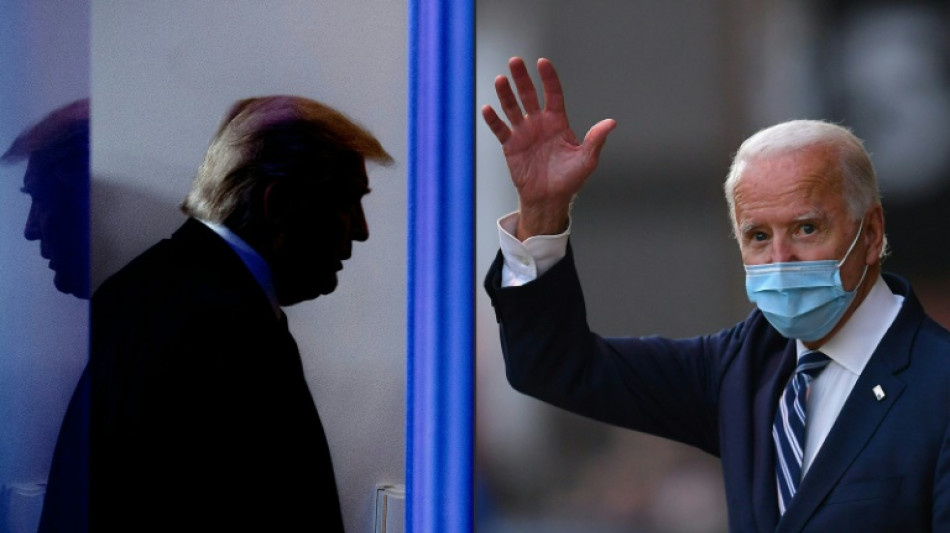
RBGPF
-0.5000


More than two years into the pandemic, a second US president has tested positive for Covid.
But the calmer outlook surrounding Joe Biden's case contrasts with the panic that accompanied Donald Trump's diagnosis: a reminder of progress made against the virus, even as it becomes clearer that the disease eventually comes for all.
Both are males of advanced age -- Biden is 79, while Trump was 74 at the time -- meaning their mortality risk is many times greater than younger groups.
Key differences however include the advent of vaccines, highly effective treatments, and a downward mutation in the severity of the virus in the time between both cases.
- Trump's 'kitchen sink' treatment -
Trump was in the middle of campaigning for reelection in October 2020 when he dropped his bombshell announcement on Twitter, sending global stock markets tumbling.
Vaccines were still another two months away and the former real estate tycoon's age, weight and lifestyle put him at special risk for Covid's worst outcomes, hospitalization and death.
The Republican had spent the summer downplaying the virus to his supporters, while mocking his Democratic rival Biden for wearing a mask.
He was airlifted to Walter Reed military hospital where he was placed on supplemental oxygen as his medical team issued vague and at times contradictory updates.
Doctors opted for the "kitchen sink" approach, treating him with antiviral remdesivir, steroids, and monoclonal antibodies that were at the time still experimental.
"He was very, very sick," Matt Heinz, a hospital physician in Tucson, Arizona, told AFP.
"I know that because he looked like my Covid patients who die," he said, referencing an infamous scene of Trump experiencing labored breathing as he posed for cameras after returning to the White House.
- Vaccines, Paxlovid for Biden -
Biden's case -- so far confined to very mild symptoms -- comes in a changed environment.
Daily deaths have sunk to the low hundreds, as opposed to around 3,300 seen in the peak Omicron wave of January 2021 -- while vaccines that are highly effective against severe disease are widely available.
Biden is double vaccinated and double boosted -- and even though the immunity from his last shot has waned, "what's really important is that underlying immune memory" infectious disease physician Celine Gounder told AFP.
While it is impossible to predict individual cases, official data shows that even during the current wave of the BA.5 Omicron sublineage, vaccination and remaining up-to-date with boosters continues to protect against hospitalization and death.
In addition, Biden is receiving Pfizer's Paxlovid, an oral antiviral that has been a gamechanger not only because it is 90 percent effective in preventing hospitalizations, but also because it is available in easy-to-take pill form.
And the virus circulating today is a far different beast to the one prevalent in 2020: Omicron's sublineages, which make up the vast majority of Covid globally, have greater affinity for the upper airways, not the lungs, where severe disease occurs.
Heinz said the majority of patients he sees now come to hospital for reasons other than Covid, but also have incidental infections.
- Shifting attitudes -
Biden's infection also comes at a time where attitudes towards the virus have shifted.
At the time Trump contracted the virus, the country was deeply polarized between liberals who practiced more caution, and conservatives who believed that preventative measures impinged on their personal freedoms.
Trump's diagnosis was thus met with a degree of told-you-so scorn by his opponents -- at a time when people becoming infected were still being dubbed "Covidiots."
That was a mistake, said Amesh Adalja, a senior scholar at Johns Hopkins Center for Health Security.
"Covid really should never have been seen as a moral failing -- it is an efficiently spreading respiratory virus that is basically an ever present risk with social interaction," he told AFP.
Indeed, by February 2022, some 60 percent of the US population had evidence of prior infection according to a government study, and the figure is likely far higher now.
"I think the goal should be to avoid severe disease, hospitalization and death and then to avoid transmission to people who are at very high risk," said Gounder, suggesting people take rapid tests and mask before they meet elderly relatives.
T.Harrison--TFWP